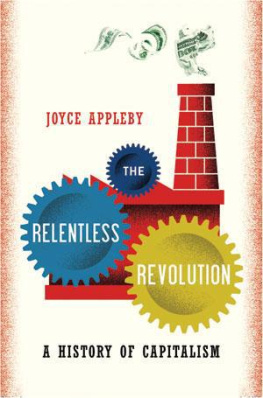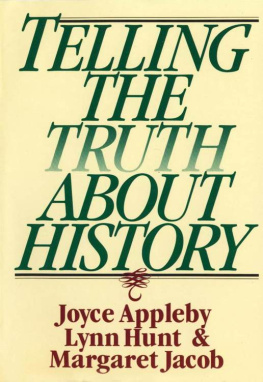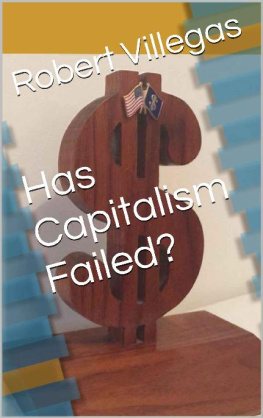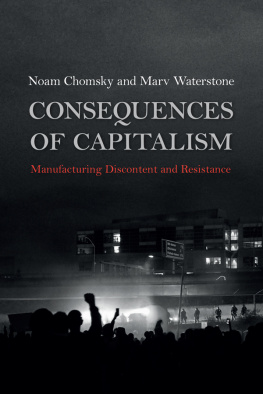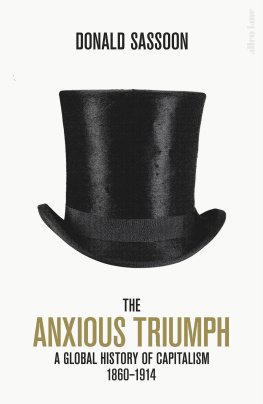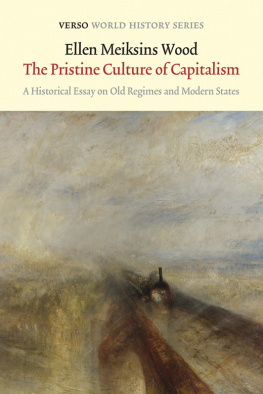THE
RELENTLESS
REVOLUTION
ALSO BY JOYCE APPLEBY
A Restless Past:
History and the American Public
Thomas Jefferson
Inheriting the Revolution:
The First Generation of Americans
Telling the Truth about History
( with Lynn Hunt and Margaret Jacob )
Liberalism and Republicanism in the
Historical Imagination
Capitalism and a New Social Order:
The Republican Vision of the 1790s
Economic Thought and Ideology in
Seventeenth-Century England
The
R ELENTLESS
R EVOLUTION
A HISTORY OF CAPITALISM
Joyce Appleby

W. W. NORTON & COMPANY New York London
Copyright 2010 by Joyce Appleby
All rights reserved
For information about permission to reproduce selections from this book, write to Permissions, W. W. Norton & Company, Inc.,
500 Fifth Avenue, New York, NY 10110
Library of Congress Cataloging-in-Publication Data
Appleby, Joyce Oldham.
The relentless revolution: a history of capitalism / Joyce Appleby.
1st ed.
p. cm.
Includes bibliographical references.
ISBN-13: 978-0-393-07723-0
ISBN-10: 0-393-07723-3
1. CapitalismHistory. 2. Economic history. I. Title.
HB501.A648 2010
330.12209dc22
2009035676
W. W. Norton & Company, Inc.
500 Fifth Avenue, New York, N.Y. 10110
www.wwnorton.com
W. W. Norton & Company Ltd.
Castle House, 75/76 Wells Street, London W1T 3QT
I dedicate this book to my son, Frank Appleby,
who has been an unfailing source of comfort, knowledge,
humor, and enthusiasm
CONTENTS
ACKNOWLEDGMENTS
W RITING THIS BOOK was actually fun, and even more pleasurable were the many conversations I had about capitalism with Flora Lansburgh, Jim Caylor, Linn Shapiro, Perry Anderson, Ruben Castellanos, Bruce Robbins, and Lesley Herrman. I had a band of readers to whom I am deeply, deeply indebted. Jack Pole brought to the reading of The Relentless Revolution a welcome and profound knowledge of history. David Levine, another fellow historian, was my toughest critic, but he generously praised the parts that he liked and always encouraged me to press on. Ware Myers gave me the kind of crisp advice youd expect from an engineer with intellectual leanings. Susan Wiener, a poet and writer, read the book with sympathy and the sharpest eye for errors grammatical, syntactical, and orthographic that I have ever known. Carlton Appleby pushed for clarity and precision. My dear friend Ann Gordon brought her care for the English language to my prose. Several colleaguesMargaret Jacob, Robert Brenner, Peter Baldwin, Nikki Keddie, Fred Notehelfer, Stanley Wolpert, Jose Moya, Mary Yeager, and Naomi Lamoreauxcontributed valuable expert knowledge. My nephew, Rob Avery, saved me from making several errors about computers, as Seth Weingram did for the arcane world of finance. Karen Orren listened and read with her usual acuteness. I was fortunate in having Steve Forman as my editor at Norton, for he was a shrewd, yet sympathetic, reader of my text. My son, Frank, to whom I have dedicated this book, read each chapter with critical insight. What was even more helpful, he shared his expansive knowledge with me and never tired of talking about capitalism. Through the kindness of Peter Reill and the Center for Seventeenth-and Eighteenth-Century Studies, I found Vic Fusilero, the finest research assistant I have ever had. Its rare that someone not only gives you an idea for a book but persists in convincing you to write it, but such is the case with Michael Phillips. After interviewing me for his radio show many years ago, he decided that I should write a book on capitalism, and so I have. I am grateful to all these friends. I may have to claim my mistakes, but I am certain that I would have had to claim a lot more without these superb readers.
THE
RELENTLESS
REVOLUTION
THE PUZZLE OF CAPITALISM
L IKE A GOOD detective story, the history of capitalism begins with a puzzle. For millennia trade had flourished within traditional societies, strictly confined in its economic and moral reach. Yet in the sixteenth century, commerce moved in bold new directions. More effective ways to raise food slowly started to release workers and money for other economic pursuits, such as processing the sugar, tobacco, cotton, tea, and silks that came to Europe from the East and West Indies and beyond. These improvements raised the standard of living for Western Europeans, but it took something more dramatic to break through the restraints of habit and authority of the old economic order. That world-reshaping force came when a group of natural philosophers gained an understanding of physical laws. With this knowledge, inventors with a more practical bent found stunning ways to generate energy from natural forces. Production took a quantum leap forward. Capitalisma system based on individual investments in the production of marketable goodsslowly replaced the traditional ways of meeting the material needs of a society. From early industrialization to the present global economy, a sequence of revolutions relentlessly changed the habits and habitats of human beings. The puzzle is why it took so long for these developments to materialize.
Most of the marvelous machines that transformed human effort began with simple applications of steam and electricity. How many people had watched steam lift the top off a pan of boiling water before someone figured out how to make steam run an engine? Couldnt someone earlier have begun experimenting with lightning? The dramatic success of eighteenth-and nineteenth-century innovations compels us to wonder why human societies remained fixed for millennia in a primitive agrarian order. How can it be that brilliant minds penetrated some of the secrets of the cosmos but couldnt imagine how to combat hunger? The answer that the times were economically backward is of course semantic and doesnt really help us pierce the conundrum of great civilized accomplishments in the face of limited economic productivity.
Starting with these questions, I am going to explore the benchmarks in capitalisms ascent, looking at how this system transformed politics while churning up practices, thoughts, values, and ideals that had long prevailed within the cocoon of custom. This is not a general study of capitalism in the world, but rather a narrative that follows the shaping of the economic system that we live with today. Nor does it cover how various countries became capitalistic, but rather concentrates on those specific developments in particular places that gave form to capitalism. My focus is on economic practices, of course, but it cant be stressed too much that capitalism is as much a cultural as an economic system. A new way of establishing political order emerged. People reversed how they looked at the past and the future. They reconceived human nature. At a very personal level, men and women began making plans for themselves that would once have appeared ludicrous in their ambitious reach. Tucked into this account will be an examination of how different societies have responded to the constant challenges ushered into their lives during the past four centuries.
If we were to visit ancient Florence, Aleppo, and Canton, we would be astonished by the rich array of foods and goods for sale in their vast bazaars, souks, and markets. We would marvel at the beauty of their churches, temples, and mosques, as well as the merchants elegant city houses and the country homes of the nobility. We would discover a population of talented artisans, knowledgeable statesmen, shrewd traders, skilled mariners, and energetic people everywhere. Yet they all were in thrall to an economic system so limited in size and scope that it could barely feed them. They accepted as normal that they would regularly suffer from drastic shortages of all kinds of goods because it had always been so.
Next page
